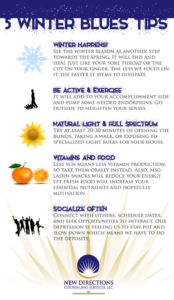 It’s not uncommon for the weather to affect your mood.
It’s not uncommon for the weather to affect your mood.
In fact millions of people in this country experience winter blues depression during dark, cold days. SAD. An appropriate acronym for the “winter blues,” SAD stands for Seasonal Affective Disorder. The symptoms begin in the fall and generally lift around May of the following year. While SAD is typically milder than other depressive disorders, it’s still not easy to cope with and manage.
HERE ARE THE TYPICAL RECOMMENDATIONS THAT COUNSELORS, THERAPIST AND PSYCHOLOGISTS OFFER:
- Exercise – it will add to your accomplishment side and pump some much needed endorphins.
- Natural Sunlight and Light Therapy – open the blinds, take a walk, or buy specialized light bulbs for your house.
- Vitamins and Eating Well – less sun means less vitamin production, so take them orally instead. Also, MSG laden snacks will only reduce your energy yet fresh food will increase your essential nutrients and hopefully motivation.
- Don’t Isolate, Get Help – connecting with a therapist, counselor, or psychologist is a proven help. It gets you out of the house and talking.
The sun is coming soon!
PEOPLE MAY ALSO RESPOND TO A SLIGHTLY DIFFERENT APPROACH INCLUDING:
- Less comparing and more sharing – comparing ourselves to other’s outward affect and behavior could intensify our low mood. We might assume their happiness is deep within and life is perfect; when in reality they are experiencing similar moods and situations like us.
- Winter Happens! – see the winter season as another step towards the spring. It will end and heal just like your sore throat or the cut on your finger. The less we focus on it the faster it seems to dissipate.
- Go Outside – people familiar with DBT skill development know that changes in temperature can often “shock” them out of their perseverations and focus them on their senses. Feel the cold air, the drippy nose, the tingling ears and know your senses are working.
- Don’t Isolate, Get Help – this one is the same as above but it is important to not go it alone. Connecting with a therapist, counselor, or psychologist is a proven help. It gets you out of the house and talking.

 It’s not uncommon for the weather to affect your mood.
It’s not uncommon for the weather to affect your mood.